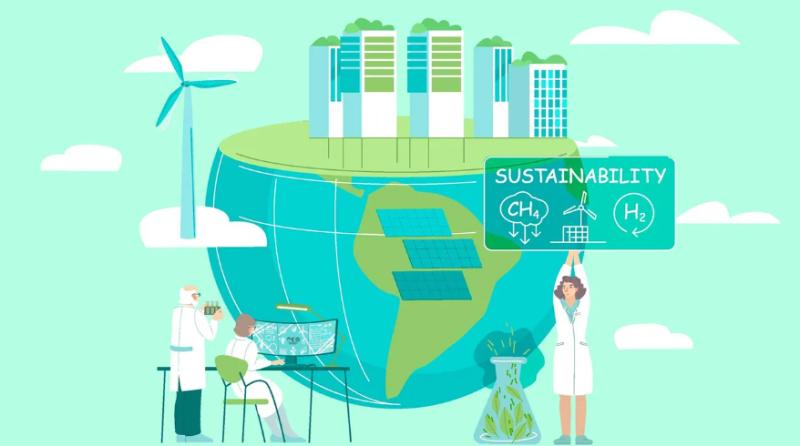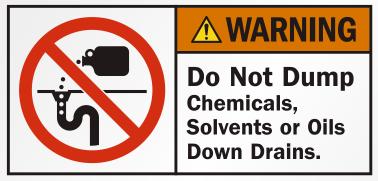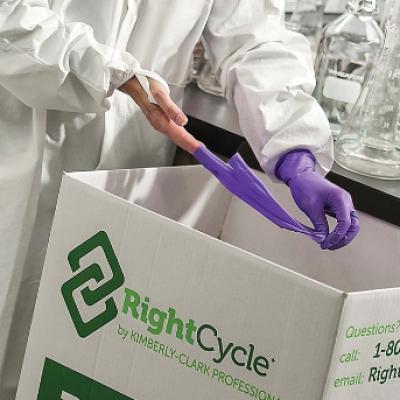Sustainability
Surprisingly (or unsurprisingly to scientists), science and scientific research contribute to a lot of waste and pollution. According to an article published by Technology Networks, "Laboratories typically use five to ten times more energy per square meter compared to office spaces ‒ with fume hoods and ultra-low-temperature freezers being two main energy-intensive culprits commonly found in labs." The use of single-use plastics, glassware, and gloves, something every scientist could say is visible and distressing, is unfathomable, with an estimated "5.5 million metric tons of plastic waste each year – the equivalent of filling 67 cruise liners."
On top of that, many reactions require the use or generation of hazardous materials that eventually end up in waste. Many scientists are now advocating for a switch to more eco-friendly laboratory practices, and young scientists are at the forefront of this movement.
Green Chemistry
In her interview, Dr. Holly Sebahar describes her thoughts on sustainability in science labs.
"Attention on green chemistry has grown over the years, I mean it was absent in the past, so the fact that people talk about it—there's an award for green chemistry at the American Chemical Society student chapter meetings. So I think that's good so younger chemists are thinking about it. But… we don't do a perfect job because, at the end of the day, the reaction needs to work, you know, and so we still use things like dichloromethane, we still—you know, we're not doing things perfectly yet. I would say we're trying to do them better. People are trying to run reactions, solvent-free, right? So you don't create all that waste." - Holly Sebahar, PhD
In chemistry, the umbrella term "green" is used to describe the experiments that have become a growing interest among chemists in this era of concern for the environment and sustainability. The idea of green chemistry is to develop innovative processes and methods of using chemicals in order to effectively reduce the carbon footprint and expenses of practicing chemistry. As the American Chemical Society notes, "The scope of these of green chemistry and engineering principles go beyond concerns over hazards from chemical toxicity and include energy conservation, waste reduction, and life cycle considerations."
In the past, chemists used toxic chemicals because there were no other options available for the reactions to run correctly. However, the ACS Green Chemistry Institute® claims that the words "wherever practicable" actually just means, "that it may not be practical or possible to avoid using substances that are toxic, and this is, if you will, the get-out-of-jail card most chemists use to try to avoid applying this principle to their work." There was no interest in putting in effort to create affordable and less toxic alternatives, which was the actual problem. Now, a lot of chemists care more about the negative impact of working with such materials. While it is a slow, uphill battle, things are changing in the lab.
One way green chemistry has tackled an environmental issue is through waste disposal. Dr. Sebahar briefly mentions the topic in her interview.
"One thing I think is dramatically better than when I was even in graduate school is that people take waste much more seriously. Back in the day, people would put whatever they wanted down the drain, just without thought, right? It is crazy to think of that. But nowadays I think the— the Environmental Health and Services really do a good job of making sure that we pay attention to what we're working with. We know how to separate it, segregate it, and then make sure we dispose of it properly. That part has been huge, I would say." -Holly Sebahar, PhD
According to MLI Environmental, one of the "short-term danger[s] of pouring chemicals down the drain is water pollution. When poured down the drain, the impact chemicals have on our rivers, lakes, streams, and other water sources cause them to be unsafe for consumption by all living creatures." Scientific research is important; however, the previous handling of hazardous materials was careless and dangerous. Now, more attention is on labs and scientists to responsibly dispose of waste.
The Glove Recycling Program
One program trying to reduce the glove waste produced in labs at the University of Utah is the Glove Recycling Program. As an advisor for the American Chemical Society chapter, Dr. Sebahar describes the program.
"One of the more recent committees... [formed by ACS] is the Green Chemistry Committee, so they're generally focused on sustainability, but this can come in different ways. The glove recycling program is just trying to mitigate the waste... going straight to the landfill. What they're doing is they collect the gloves and then we send them to a company that's able to recycle the gloves into say, like a pot for a plant or a bench or something like that. So it's really trying to get stuff out of the landfill— and that was student-driven, they came up with the idea... The good thing is that the program started in the teaching labs, but then the researchers that were TAs for our teaching classes say, ‘Hey, can we have a box in our research lab’, because they go through even more... if you consider all the hours their whole group is there. So the good thing is that it grew to not just the teaching, but also the research labs." -Holly Sebahar, PhD
With the goal of tackling massive waste from single-use gloves, the Glove Recycling Program is expanding to many labs across the campus. The gloves that are being recycled can be converted into nitrile pellets that are then used in the construction of lawn furniture, plastic containers, and park benches. In some cases, these pellets can also serve as a cleaner energy alternative to fossil fuels", according Twist Bioscience. Sending the gloves away from the landfills and towards a better environment with this program is something that the students in the ACS Green Chemistry Committee are actively pursuing.
A Word From Holly Sebahar, PhD
During the interview, Sebahar, PhD shared the source and inspiration for her passion for sustainability.
"I think I've always been interested in sustainability... I loved my university, [the] University of Minnesota Morris. Really, I am so proud of them. They are a leader in the field of sustainable energy. They are actually what is it— carbon neutral. They have a windmill, they have… hydrothermal energy. They are using all kinds of green energy on campus and so when I was there, I was part of a group called MPIRG, it's the Minnesota Public Interest Research Group, and I worked on different things like homelessness, but one of the big things was trying to, I don't know, be kind to the planet." -Holly Sebahar, PhD
Page written and researched by Safiya Hamud. Edited by Caitlin Pham.
Later edited by Pamalatera C. Fenn



